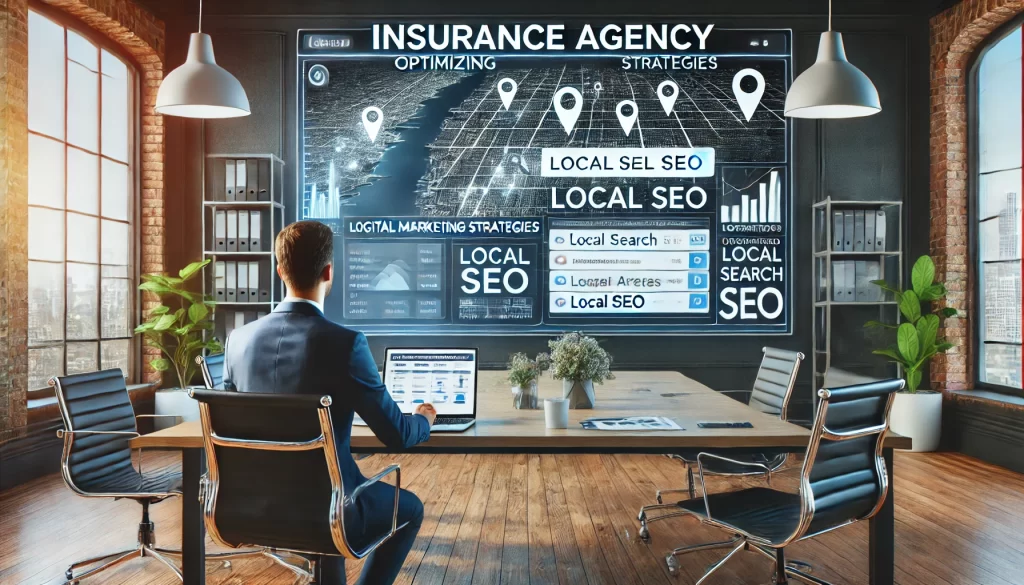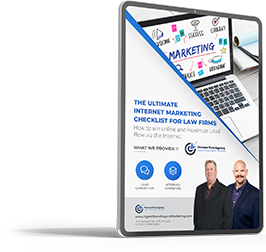Struggling to Attract Local Clients? Your Website Might Be the Problem.
Imagine this: A potential client in your city urgently needs home or auto insurance. They grab their phone, type “best insurance agent near me” into Google, and within seconds, they choose a competitor—not because they offer better services, but because they appeared first in search results.
If your insurance agency isn’t showing up at the top of local search results, you’re losing business to competitors who have optimized their online presence. In today’s digital world, local SEO isn’t just an option—it’s a necessity for insurance agents who want to grow their business and stay ahead of the competition.
This guide breaks down exactly how to implement an effective local SEO strategy that drives more traffic, increases visibility, and helps you convert online searches into real clients.
Key Takeaways:
- Local SEO is Essential for Insurance Agencies
- To attract local clients, insurance agencies must optimize their online presence to appear in search results for location-based queries.
- Mobile Optimization is Critical
- Since most users search for insurance services on smartphones, a responsive, mobile-friendly website is a must for higher rankings and a better user experience.
- Website Load Speed Impacts Rankings and Conversions
- A slow-loading website drives visitors away and hurts search rankings. Aim for a load time under one second by optimizing images, reducing scripts, and choosing reliable hosting.
- Target the Right Local Keywords
- Use location-specific keywords (e.g., “affordable home insurance in [City]”) to rank for searches that potential clients are making in your area.
- On-Page SEO Matters
- Optimize title tags, meta descriptions, headings, URLs, and website content with local keywords while avoiding keyword stuffing.
- Localized Content Builds Authority
- Creating location-specific blog posts, guides, and FAQs enhances credibility and helps search engines recognize your relevance to local searches.
- High-Quality Local Links Boost Rankings
- Earning backlinks from local directories, industry blogs, and community websites improves your site’s authority and search visibility.
- Google Business Profile (GBP) is a Game-Changer
- Optimizing your Google Business Profile with accurate business information, photos, updates, and reviews helps you rank in Google’s Local Pack and Google Maps.
- Online Reviews Influence Search Rankings and Trust
- Encourage satisfied clients to leave Google and Yelp reviews, and respond professionally to all reviews to enhance credibility and client engagement.
- A Strong Local SEO Strategy Leads to More Clients
- By implementing mobile optimization, local keyword research, content marketing, link-building, and GBP optimization, your agency can increase visibility, generate leads, and grow your business.
Key Elements of an Effective Local SEO Strategy
To dominate local search rankings, insurance agencies must focus on:
- Optimizing for mobile users, since most local searches happen on smartphones
- Selecting the right local keywords to target high-intent prospects
- Creating localized content that connects with potential clients in your area
- Building high-quality local backlinks to boost website credibility
- Leveraging Google Business Profile (GBP) to improve visibility in Google’s Local Pack
Below are the essential steps to ensure your agency ranks higher and wins more local clients.
1. Make Your Website Mobile-Friendly
Most potential insurance clients search for services on their smartphones. If your website isn’t mobile-optimized, visitors will quickly leave—leading to lost leads and lower rankings on Google.
A responsive web design ensures your site adjusts seamlessly to any screen size, improving user experience and increasing your chances of ranking higher in search results.
2. Improve Website Load Speed
Would you wait five seconds for a website to load? Neither will your potential clients.
Google favors fast-loading websites, and a slow site can significantly hurt your SEO. Your pages should load in under one second to keep visitors engaged.
To improve speed:
- Compress large images
- Minimize unnecessary scripts
- Enable browser caching
- Choose a reliable hosting provider
Use Google PageSpeed Insights to test your site’s speed and identify areas for improvement.
3. Conduct Local Keyword Research
If you’re not targeting the right local keywords, your website won’t show up when potential clients search for insurance services in your area.
Instead of using broad terms like “auto insurance,” optimize for location-specific keywords such as:
- “Best auto insurance in [City]”
- “Affordable home insurance near [Neighborhood]”
- “Independent insurance agents in [County]”
Use tools like Google Keyword Planner and SEMrush to find high-traffic, low-competition keywords that can give you an edge.
4. Optimize On-Page SEO for Local Keywords
Once you’ve identified your target keywords, it’s time to strategically place them throughout your website, including:
- Title Tags & Meta Descriptions – Add location-based keywords for better rankings.
- Headings (H1, H2, H3) – Use structured headings with relevant search terms.
- URL Structure – Keep URLs short and descriptive (e.g., www.youragency.com/home-insurance-[city]).
- Website Content – Naturally incorporate keywords without overstuffing them.
Your content should be engaging, informative, and optimized for both search engines and potential clients.
5. Create Localized Content
To stand out, create content that speaks directly to your local audience.
Examples include:
- City-specific insurance guides, such as “Top Home Insurance Options in [City]”
- Local insurance FAQs tailored to your region
- Case studies featuring real clients from your area
Google rewards localized, high-quality content by ranking it higher in search results, helping your agency get noticed faster.
6. Build High-Quality Local Links
Google considers backlinks from reputable sources a sign of trustworthiness. However, not all links are equal—quality over quantity is key.
For local SEO, focus on getting backlinks from:
- Local business directories
- Community news websites
- Chamber of Commerce pages
- Industry blogs through guest posting
The more relevant, high-quality links pointing to your site, the higher Google will rank you.
7. Optimize Your Google Business Profile (GBP)
Google Business Profile (formerly Google My Business) is one of the most powerful tools for local SEO. When optimized correctly, it can put your agency in the coveted Google Local Pack—the top three listings that appear for location-based searches.
To optimize your GBP:
- Ensure your business name, address, and phone number (NAP) are accurate.
- Choose the right business categories for your services.
- Add high-quality photos of your office and team.
- Regularly post updates, promotions, and blog articles.
- Encourage positive customer reviews to boost credibility.
An active, well-maintained GBP listing can drastically increase your visibility in search results and drive more traffic to your website.
8. Leverage Online Reviews and Testimonials
Potential clients trust what others say about you more than what you say about yourself. Positive reviews influence both search rankings and consumer trust.
Encourage happy clients to leave reviews on:
- Google Business Profile
- Yelp
- Better Business Bureau (BBB)
Responding to reviews—whether positive or negative—shows professionalism and helps build trust with potential customers.
Final Thoughts: Take Control of Your Local SEO
If your insurance agency isn’t ranking high in local searches, you’re missing out on potential clients every single day.
By implementing the right local SEO strategies—such as mobile optimization, keyword research, content creation, and Google Business Profile management—you can increase visibility, drive more traffic, and grow your business.
Need Help with Local SEO?
We specialize in helping insurance agencies rank higher and attract more local clients through proven SEO strategies.
Contact us today for a free consultation!
Frequently Asked Questions (FAQs) About Local SEO for Insurance Agencies
What is local SEO, and why is it important for insurance agencies?
Local SEO is the process of optimizing your website and online presence to rank higher in location-based searches (e.g., “best insurance agent near me”). It is crucial for insurance agencies because most clients search for local services online. A strong local SEO strategy helps attract more leads, improve search rankings, and increase business visibility in your target area.
How can I make my insurance agency’s website mobile-friendly?
To make your website mobile-friendly:
- Test your website on Google’s Mobile-Friendly Test tool.
- Use responsive web design so your site adapts to any screen size.
- Ensure fast loading speeds by optimizing images and minimizing scripts.
- Make navigation easy with clear menus and clickable buttons.
What are the best keywords to target for local SEO?
The best keywords are location-specific and insurance-related. Examples include:
- “Affordable auto insurance in [City]”
- “Best home insurance agent near [Neighborhood]”
- “Independent insurance broker in [County]”
- Use keyword research tools like Google Keyword Planner, Ubersuggest, or SEMrush to find relevant keywords with good search volume and low-to-medium competition.
How does Google Business Profile (GBP) help with local SEO?
An optimized Google Business Profile (formerly Google My Business) increases your chances of appearing in Google’s Local Pack and Google Maps. It allows potential clients to find your business easily, view important details (address, phone number, reviews), and engage with your agency through posts, photos, and direct messages.
How can I get more online reviews for my insurance agency?
Encourage satisfied clients to leave reviews by:
- Offering incentives (where allowed by regulations), such as a free consultation or entry into a giveaway.
- Asking them directly after a successful service interaction.
- Sending a follow-up email with a link to your Google Business Profile.
- Displaying a review request on your website or in your office.
What type of content should I create for better local SEO?
To improve your local SEO, create location-based, informative content, such as:
- News and updates about your agency’s involvement in the local community.
- Blog posts on local insurance regulations and FAQs.
- Case studies and success stories from real local clients.
- Guides like “Best Home Insurance Options in [City]”.
How do backlinks help my website rank higher in local searches?
Backlinks (links from other websites to yours) signal to Google that your site is trustworthy and authoritative. High-quality local backlinks from business directories, community websites, and industry blogs can improve your site’s ranking and attract local traffic.
How long does it take to see results from a local SEO strategy?
Local SEO is a long-term strategy. While small improvements may be noticeable within a few weeks, significant ranking increases usually take 3 to 6 months. Factors like competition, website quality, and the consistency of SEO efforts impact how quickly you see results.
How can I check if my local SEO efforts are working?
Track your local SEO progress by:
- Tracking the number of new leads and phone calls generated from organic search.
- Monitoring Google Business Profile insights (views, clicks, calls).
- Checking your rankings for targeted local keywords using tools like Google Search Console or SEMrush.
- Analyzing website traffic with Google Analytics.
Should I hire an SEO expert or do it myself?
If you have time, resources, and technical knowledge, you can manage basic local SEO yourself. However, hiring an SEO expert can help you get faster and more effective results, especially if you face strong competition in your area or need advanced optimization strategies.
This article is a collaboration between Carl Willis and OpenAI’s ChatGPT. Created on February 5, 2025, it combines AI-generated draft material with Willis’ expert revision and oversight, ensuring accuracy and relevance while addressing any AI limitations.



